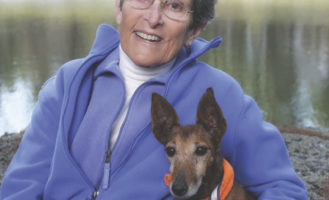A Salon! Even Better Than a Book Club!
One afternoon in May I watched as 25 women and four men, average age mid-80s with some up in their 90s, streamed into a room clutching copies of Lilith. Those using walkers deposited them in a small alcove, like cars in a parking lot. Soon, every available seat was taken, as people, eyes alert, waited for me to kick off the first-
ever Lilith salon—one of the discussion groups meeting in more than a hundred locations to talk about the content in each new issue of the magazine—at
the Esplanade, a senior residence on New York’s Upper West Side.
“Who was Lilith?” asked one woman.Discussion of the myth came along with
a mention of that old shtetl custom of
the bendel, a red string around the wrist to ward off evil, which made the women smile. “She was a little bit bad!” said one person gleefully. These bubbehs were absolutely getting it.
I suggested beginning our salon conversation with Diane Balser’s piece on “Non-Motherhood by Choice,” in the Spring 2013 issue. The subject struck a nerve, instantly
“When I was young, having children was something you just did,” said one woman.
Said another: “I had an aunt, she never had children. She was too busy, she worked in the garment trade, she was a leader
in the ILGWU.”
“My Aunt Bessie, we were like her children,” offered another woman. “And when we used to ask her why she never got married, she said, ‘obody asked me!’”
To which a third woman replied: “Aunt Bessie wasn’t telling the truth! I’m sure that somebody asked her!”
I grabbed the bait. “Well, we don’t know the facts about Aunt Bessie,” I said, (wondering if she, like so many of those spinster aunts of old, was a lesbian). “But let’s talk about what marriage meant back then. Was getting married, and having children, a choice when you were young?”
Three women sitting in the middle row shook their heads, emphatically. “No,” said one, indignantly. Her blue eyes gleamed. “It was just expected of you!”
I said, “But now, it’s different, isn’t it?”
“Women didn’t have choices then,” said a gray-haired woman with glasses. “But now,” she said approvingly, “times have changed.” All over the room, heads were bobbing up and down in agreement. “Women always had to make all the sacrifices back then!” said another. My mother, Esther Braun Sparberg, 91—she had recently moved into the Esplanade—talked about how she pulled off being a working mother during the 1960s, at a time when women were told that they should stay home and raise their families. I asked the crowd if they remembered the explosive reaction to Betty Friedan’s The Feminine Mystique when it came out in the early 1960s. More emphatic nodding.
Then one of the four men—his name was Harry—raised his hand; the other three had been sitting quietly, listening to the discussion. Harry said: “Some women think that they can stop fighting for their rights now. But they need to keep at it.”
Good point, Harry. But don’t worry. These irrepressible women around you, whose combined ages totals something like 1800 years, are continuing to raise their voices.
The power of conversation!
Lilith salons are quarterly gatherings where you’ll encounter new ideas and new people when you come together to talk about the original and provocative thinking you find in each new issue. Lilith will provide trigger questions to help get the conversation started. Learn more about Lilith salons—to join one or start your own—visit www.Lilith.org/salons or call us at 212-757-0818.




